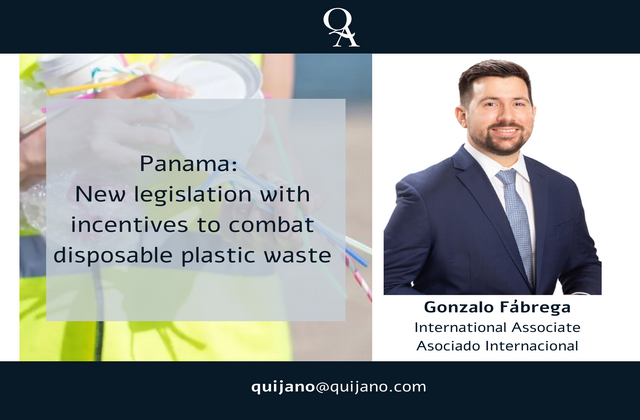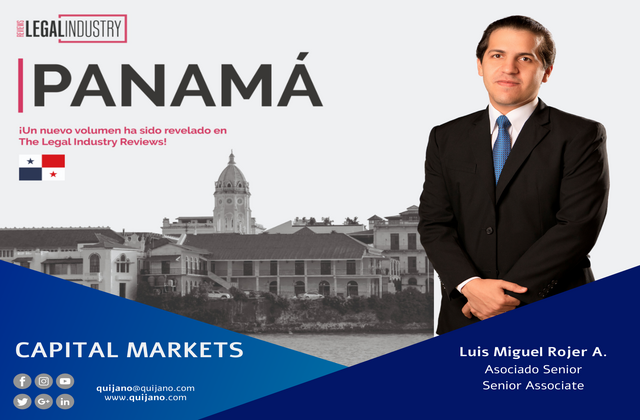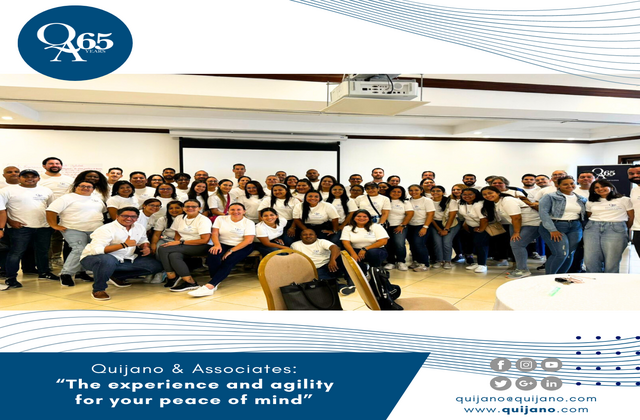New legislation with incentives to combat disposable plastic waste

Panama’s new Law 223 of the 8th of June, 2021 has established new incentives to companies engaged in activities related to combat or reduce disposable plastic waste and in protection of the ocean from such contamination.
Nowadays there are about one hundred corporations responsible for 90% of the plastic waste contamination of the environment in the entire world, and merely twenty of them produce more than half of the plastic waste pollution of the sea, which spreads in every one of the oceans in our planet.
The amount of plastic waste that has entered the sea since 1950 is equivalent to a bag of trash on every 3 feet of all existing seashore around the world, and the microplastics produced in the sea spread to such an extent that items of such microplastics have been found in Mount Everest and in the bottom of the sea 10,916 meters deep in the Marianas Trench, which is the deepest in the planet.
If such level of waste is maintained, according to the United Nations, the ocean will contain more waste that fish, and such a possibility has prompted a world-wide alliance of 1,200 companies and organizations to promote activities against the production of disposable plastic, which become pollution of the sea.
Many companies in more than a hundred countries have changed production and distribution policies in order to reduce or eliminate the production of single-use disposable plastic. Besides the reward of reducing contamination of the seas, any legal entities establishing in the Republic of Panama will benefit from the following.
- More loyal clientele conscious of the plausible decisions to enhance the reputation of the brand involved.
- Increase in sales because many clients now usually demand that 50% of the plastic be recycled.
- Advantages in marketing because such efforts against contamination attract the media and the environmental protection organizations.
- Prepare the company for future environmental legislation as it goes on creating public concern all over the world.
About twenty more developed countries have prohibited the use of single-use plastic, and the Republic of Panama has already prohibited the use of plastic bags and other similar packing.
Quijano & Associates has the pleasure to comment the enactment of Law 223 of the 8th of June, 2021 “to establish environmental protection incentives to foster sustainable commercial procedures, conversion and restructuring companies and the development of recycling industries in the Republic of Panama”.
Law 223 established fiscal incentives for companies engaging in industrial recycling and for individuals or legal entities restructuring their activities to manufacture and to use biodegradable products. The individual or the legal entity interested in the fiscal incentives of Law 223 has to be endorsed by the Ministry of the Environment.
Under Law 223, the following terms shall have the following meanings:
- Industrial Recycling Plant. Facilities specializing in the recovery of residues to transform them in items with a new useful existence through various processes of transformation for their revaluation and prevent their disposal as waste.
- Reconversion. The individuals or legal entities engaged in the industry of plastics, but have been bound to migrate machinery or to change their line of products to biodegradable items with no plastic content as provided in Law 187 of 2020 against the use of disposable plastic.
The benefits of Law 233 for legal entities specialized in the operation of industrial plants for recycling consist of five (5) years of exemption from the following taxes:
- Income tax.
- Tax on dividends or quotas distributed to partners or to national or foreign shareholders.
- Import tax on machinery and equipment required for manufacturing.
The law does not apply to legal entities engaging in collecting recyclable items for exportation. Recycling must be carried out within the territory of the Republic of Panama.
Law 223 offers the following exemptions for five (5) years to individuals or legal entities modifying their activities and using biodegradable products to replace the use of plastics.
- Exemption of import tax on machinery and equipment.
- A deduction of 15% from the amount of income tax.
Law 223 does not apply to individuals or legal entities using replacement materials with synthetic plastic and the same degradable labels or a recycled product. The plastic must be free of any content derived from petroleum or other hydrocarbons.
Upon compliance with all prior procedures and after obtaining the required permits to conduct its economic activity, in order to apply for the benefits of this Law 223, the interested party has to submit the request to the Directorate General of Income Tax of the Ministry of Economy and Finance before requesting endorsement by the Ministry of the Environment.
Besides the above-mentioned benefits, it should be noticed that any company interested in manufacturing products for export will find the best and more embracing access to air and sea transportation of cargo to all of the countries in the continent including the Caribbean.
If you have any enquiries, please do not hesitate to contact us at quijano@quijano.com




